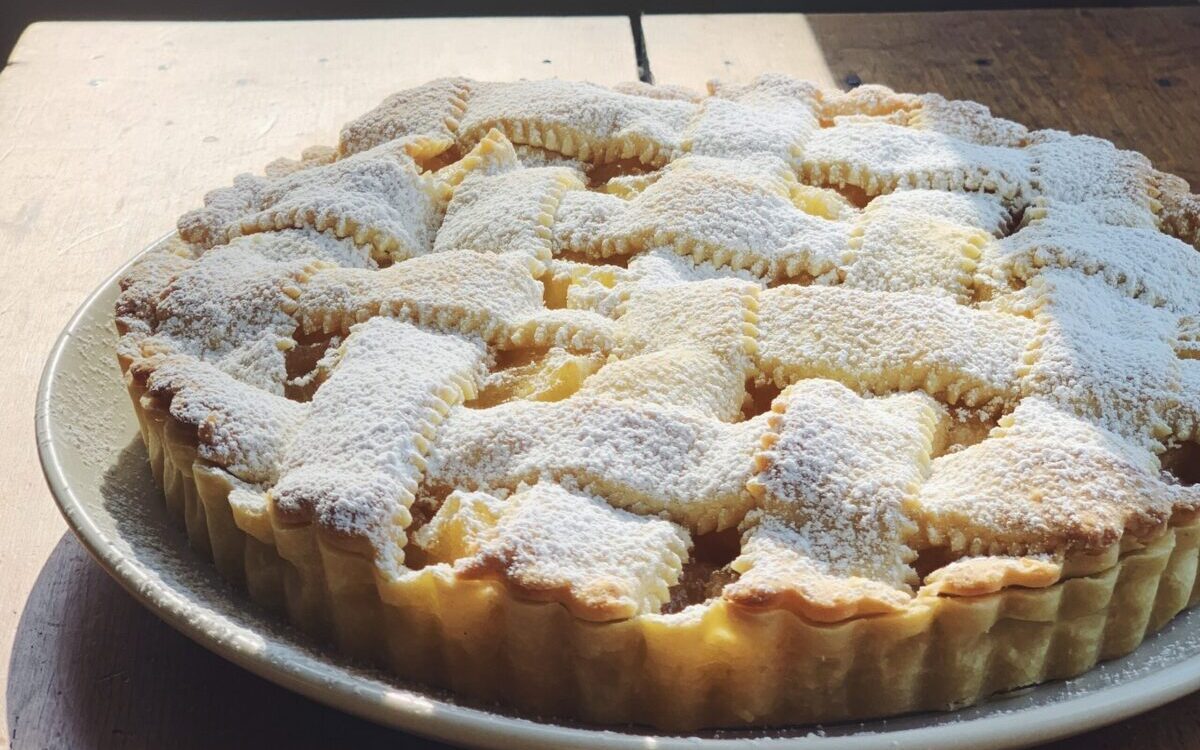
Domenica Marchetti's Apple Crostata
|
|
Time to read 4 min
qb Pasta Club doors are open Join by Feb 26 for special launch pricing.
|
|
Time to read 4 min
This apple crostata has my heart. It was one of the first dessert recipes I created (years ago!) and I still make it regularly. I have aIways preferred it to classic apple pie because the filling is briefly cooked before being baked in its buttery pasta frolla crust, a step that yields tender pieces of fruit, with no intrusive undercooked bits.
Pasta frolla is a classic Italian pastry, used for tart shells and for cookies. There are many (countless, really) recipes for it; every pastry chef and home baker seems to have her own favorite. The basic ingredients are simple: flour, sugar, butter, eggs, a pinch of salt, and a grating of citrus zest. Mine is generous with butter, and I use confectioners’ sugar instead of granulated.
This produces a rich dough that is beautifully smooth and rolls out like a bolt of satin. Using a fluted pasta/pastry cutter to make the lattice top gives the crostata an elegant flourish.
Both the filling and the pastry can be made in advance and refrigerated for two days or frozen for longer. Be sure to use a mix of apple varieties to create an appealing sweet-tart flavor and a mix of textures (some will hold their shape during cooks, while others will turn pulpy). Among my favorites: Gold Rush, Crimson Crisp, Crimson Topaz, and Honeycrisp.
Also, I steer clear of traditional apple pie spices in this crostata, so the apple flavor, brightened only with lemon juice and zest, shines through. Note that the pasta frolla recipe makes more than you’ll need for a 9-inch crostata. This is by design; use the leftover pastry to make decorative cutouts, or roll it out, cut shapes out with a cookie cutter, and bake separately.

2 hours, 25 minutes
35 minutes
Makes one 9-inch crostata
For the pasta frolla:
3 cups unbleached all-purpose flour, plus more for dusting
1 cup confectioners’ sugar
1/4 teaspoon fine sea salt
Finely grated zest of 1 small (or half large) organic lemon
1 cup (2 sticks) cold unsalted butter, cut into 1/2-inch cubes
1 large whole egg
2 large egg yolks
For the filling:
6 sweet-tart apples (1 kg), at least two varieties, peeled, cored, and cut into 1/2-inch dice (about 7 cups)
3 tablespoons salted butter
1/2 cup granulated sugar
Juice of 1 small or 1/2 large lemon
Confectioners’ sugar for garnish
Put the flour, sugar, salt, and lemon zest in the work bowl of a food processor fitted with a metal blade. Pulse briefly to combine. Distribute the butter around the bowl and pulse until the mixture is crumbly. Add the whole egg and egg yolks and process until the mixture just begins to clump together in the work bowl.
Turn the dough out onto a lightly floured surface and briefly knead it together. Without overworking it, shape the dough into a disk, patting rather than kneading it. Wrap tightly in waxed paper or reusable wrap and refrigerate for at least 1 hour, or until well chilled.
Cut the dough disk into 2 portions, one slightly larger than the other. Rewrap the smaller portion and refrigerate it. On a lightly floured surface, roll out the larger portion into an 11-inch (28 cm) circle, about 1/8-inch thick or slightly thicker (1/2 cm). Wrap the dough around the rolling pin and drape it over a 9-inch (23-cm) fluted tart pan with a removable bottom. Gently press the dough into the bottom and up the sides of the pan. Use the rolling pin or the flat of your hand to press around the perimeter of the pan to cut off excess dough. Chill the pastry shell in the refrigerator for 30 minutes.
In a heavy-bottomed saucepan, combine the apples, butter, granulated sugar, and lemon juice and bring to a simmer over medium-high heat, stirring to help melt the butter and to prevent scorching. Cook, stirring often, for about 15 minutes, until the apples are tender, and the mixture has thickened. Remove from the heat and let cool completely.
Heat the oven to 350° F (176° C). Remove the remaining portion of dough from the refrigerator to warm up slightly, just enough to roll out.
Remove the pastry shell from the refrigerator. Spoon in the cooled filling and smooth out the surface to make it even. Roll out the remaining dough portion into a circle about 1/8 inch thick or slightly thicker (1/2 cm). With a fluted pastry wheel , cut it into strips (about 1 inch / 2 1/2 cm) wide (you can make them thinner, but I like the quilted look of wide strips arranged into a lattice). Lay the strips over the filled tart in a lattice pattern. You can weave the strips if you like (I do when I want to be fancy), but the tender dough tends to tear easily, so it’s not necessary. Gently press the ends of the strips along the perimeter of the pan to cut off the overhang.
Bake the crostata for 35 to 40 minutes, or until the crust is golden. Remove from the oven and place it on a wire rack to cool for 20 to 30 minutes, until cool enough to handle. Remove the rim of tart pan and let the crostata cool completely. Using a wide spatula, remove the crostata from the bottom of the tart pan and transfer it to a serving platter. Dust with confectioners’ sugar and serve.
